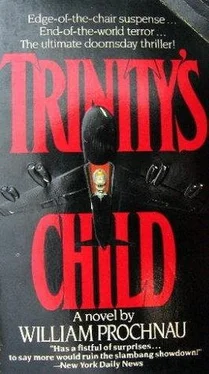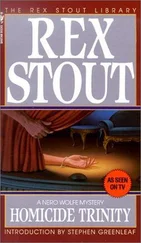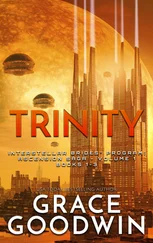Eternal Vigilance
The unleashed power of the atom has changed everything but our way of thinking.
—Albert Einstein
• 2100 Zulu
At 2040 Zulu, Sedgwick’s transmission reached the two TACAMO aircraft through the Volna satellites.
At 2044, the codes were completed, followed by the encrypted instructions: “CEASE ALL HOSTILITIES IMMEDIATELY.”
At 2046, Olney received a message requesting further codes because of the confusion over the interrupted transmission from the E-4 command plane.
At 2049, the second message was completed.
At 2052, Olney’s telegraph clattered with the beginning of the incoming message: “CONFIRM CESSATION OF HOSTILITIES.” Sedgwick watched expectantly as the machine hummed in a brief pause, as if to interject its own emphasis. Then it clattered its conclusion: “ALERT STATUS MAINTAINED.”
The young naval officer stared at the last words. Suddenly and overwhelmingly, his relief dissolved into a great and unexpected wave of depression. He shuddered involuntarily, his eyes riveted on the system’s final statement. Then he shook his head slightly, tore the message off the telegraph, and read it to the President.
At 2054, the leaders of the two nuclear superpowers spoke one last time.
The President lay in his hospital bed in the radio room at Olney, the short telegraphic message resting on his stomach. He could not see it, but Sedgwick’s reading still rang in his ears. As he spoke into the phone, he found his voice extraordinarily weary and desolate. “There may be aftershocks, Mr. Premier. Are you prepared for them?”
“Another lost city, Mr. President?” The President could hear his own despondence reflected in the tired Russian voice. “Two cities? Three?” the President knew the Premier had the same message in front of him, its Cyrillic lettering glaring at the Soviet leader with the same haunt. “We will cope,” the Premier continued somberly. “As will you.”
“Yes, we will cope with lost cities,” the President said. He shifted uneasily in his bed. “Those are not the aftershocks that concern me, Mr. Premier.”
Labored breathing undulated across the distance between them. “No…” the Premier continued slowly. “The world will awaken tomorrow with one hundred million people dead and still more dying. It also will awaken with the same differences it had yesterday. Will we cope with them?”
The President peered into the empty whiteness. He felt tears forming in eyes that would forever see the sun. “It also will awaken with forty thousand unused nuclear weapons, Mr. Premier,” he said. “Will we cope with them?”
“We will cope with one or we will cope with the other, Mr. President. We were blessed with great luck today.”
“Luck….”
A long silence followed, as both men burrowed far within themselves, dwelling, as they so rarely had before, on the same thought.
“Do you believe”—the President finally broke the quiet—“that we will draw any benefit from this, Mr. Premier?”
The Premier said nothing.
“Do you think that our one hundred million dead will become the symbols that will bring the world to its senses?” the President continued. “That would be luck, Mr. Premier. We will need much more of that precious commodity.”
The Premier sighed. He spoke in the same fatalistic voice the President had heard in their only personal meeting, and he uttered the same fatalistic words. “We now return to our world of men, Mr. President.”
The memory of their one meeting filled the President’s mind.
“Yes, we now return to our world of men, Mr. Premier,” the President repeated quietly into a phone linking two mole holes a planet apart. “Do you think we can control such a place?”
The President heard nothing for a moment, and he shifted uncomfortably, sending the short message relayed by Volna fluttering toward the floor. Near him, Sedgwick watched tears streaming from his Commander-in-Chief’s eyes. He averted his gaze, even from the sightless man, and followed the paper as it wafted to the floor between their beds.
“I do not know, Mr. President,” the Premier finally answered.
Sedgwick leaned out of his bed, tugging against the umbilical system of the intravenous tubing.
“Nor do I, Mr. Premier,” the President said.
Sedgwick leaned farther, pulling against the system. His hand stretched toward the paper—his fingers hovering for a moment just inches away from “ALERT STATUS MAINTAINED”—and then he fell back into his bed, the system holding him, and he closed his eyes.
At 2058 Zulu, the commander of the Rocket Forces ordered the closing of the silo doors throughout the Soviet Union. He then completed the unbuttoning of his holster, withdrew his service revolver, and shot himself. In the concrete wombs beneath two dozen fields stretched across Asia, the young pink-cheeked men waited patiently. A shift change was long overdue, but the flickering green lights could not be left unmanned.
At 2100 Zulu, the American submarines emerged from the depths of many seas. They lingered briefly, protected just below the surface, and listened. A moment later they returned to their safe haunts and waited, eternally vigilant.
In the mid-Pacific, the storm’s fury gradually ebbed. The grayness gave way to the distant streaks of yellow, and the yellow began to fill with growing patches of blue. Kazakhs relaxed slightly as the tumult eased and left Polar Bear One flying in a precarious but steady washboard bump.
“So now what?” Moreau asked.
Kazakhs squinted into the bright sunlight. The storm was disappearing in the void behind them. The ocean emerged in the void ahead.
“Rarotonga?” he said.
He looked out the side window at the battered swept-wing remnant of his old world. A gouged scar remained where the turmoil had torn away the engines, two of man’s useful tools. Next to the scar’s emptiness another of man’s tools, the sleek white missile he couldn’t shake, filled the vacuum. It held itself snug, a survivor like them.
“Bora Bora?”
The remaining engines held them precariously several hundred feet above the sea. He strained over the side, watching the past rush to the rear. He turned to look ahead at a horizon too low, the future unseen somewhere beyond its edge.
“Hiva Oa?”
He glanced at his watch. It read 2100 Zulu by a time that no longer had meaning. He ran his eyes across gauges and dials and switches that told him nothing.
“Papeete for the lady?”
“Kazaklis!”
“Two in a canoe?”
“Kazaklis!”
He squinted again into the sun, trying to relate it to the time he was abandoning and relate both to the gauges that had abandoned him. He knew only that they were somewhere near the equator and somewhere near the 180th meridian, the artificial line civilization used as its dateline, the artificial intersection man had marked as the very center of his earth. It was the place where yesterday became tomorrow and tomorrow became yesterday and today didn’t exist. As far as Kazaklis could see, nothing was there.
He reached for the first switch that had failed, as if something should change as they entered a new day. He flicked it aimlessly and felt a slight shudder. But the missile stayed with them.
So now what?
“I don’t know, Moreau.”
He reached toward Moreau’s thigh and took her hand instead. It shuddered but stayed with him, settling into his. Quietly they absorbed each other’s shuddering as they also absorbed the shuddering of the fragile craft that held them so precariously above the void.
“Welcome to tomorrow,” Kazaklis said.
Читать дальше












